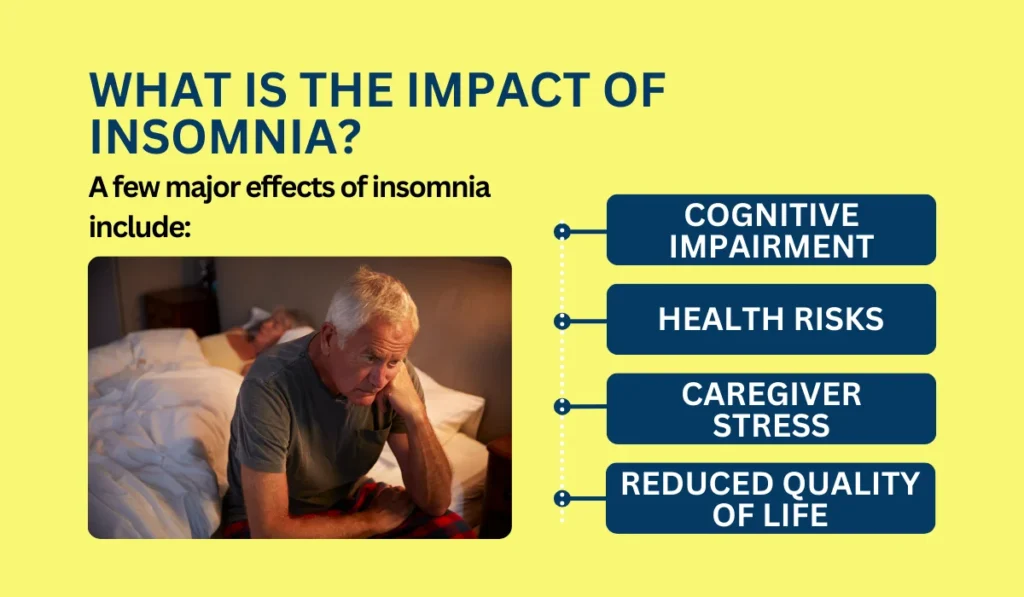Caring for a loved one with insomnia can be both exhausting and difficult. Sadly, nearly half of older adults report issues like trouble falling asleep, frequent awakenings, and earlier rising, often accompanied by daytime naps.
As a caregiver, understanding this challenge is vital to improving sleep and overall well-being.
That’s why this guide will explain the causes of insomnia and how you can help manage any sleep difficulties.
Key Takeaways
- Insomnia affects sleep patterns, often causing daytime tiredness and poor quality of sleep, especially in older people.
- Setting routines, improving the sleep environment, and focusing on good sleep habits are key strategies for caregivers.
- In more serious cases, professional help, such as sleep medicine or cognitive behavioral therapy, may be needed.
What Is Insomnia?
Insomnia is a common sleep problem, especially for older adults. It involves trouble falling asleep, staying asleep, or waking up too early and not being able to fall back asleep.
While having a sleepless night now and then is normal, ongoing insomnia can lead to serious health risks. For seniors, it can disrupt the sleep-wake cycle, leading to higher chances of falls, memory problems, and confusion.
As we get older, it’s normal to have some changes in sleep habits. But when these problems stick around, they can point to bigger health concerns.
What Causes Insomnia in Older Adults?
Insomnia in older adults can have various causes, including natural sleep changes that occur with normal aging, ongoing health conditions, or the side effects of medications like benzodiazepines. These factors often lead to poor sleep and frequent sleep disturbances, affecting both health and daily life.
Below, we’ll dig into several common causes of insomnia, ranging from medical problems to environmental factors.
Medical Conditions
Conditions like obstructive sleep apnea, pulmonary issues, restless legs syndrome (RLS), and frequent nighttime urination (nocturia) often result in poor sleep.
These conditions often leave seniors feeling unrested and fatigued, contributing to a decline in overall health.
Medications and Side Effects
Certain medications, while helpful for treating various conditions, can unintentionally worsen insomnia by disrupting natural sleep cycles. For example:
- Antidepressants (SSRIs)
- Antihistamines
- Sleeping Pills
- Stimulants
Psychological Factors
Sleep in older adults can be affected by both psychological and environmental factors. Mental health concerns such as anxiety, depression, and cognitive changes linked to conditions like Alzheimer’s disease or Parkinson’s disease often disrupt sleep patterns.
Addressing these issues through psychiatry, counseling, or other supportive therapies can help manage symptoms and improve sleep quality.
Environmental Factors
In addition to mental health, the sleep environment plays a crucial role. Factors like light, noise, and room temperature can interfere with the ability to fall or stay asleep. A solid option is creating a sleep-friendly space.
Aiming to keep their room quiet, dark, and at a comfortable temperature can help reduce excessive daytime sleepiness and promote better rest.
What Is the Impact of Insomnia?

For older adults, insomnia can lead to serious health risks and caregivers often feel the strain as well. Lack of sleep increases the risk of health complications, making the caregiving process far more difficult. A few major effects of insomnia include:
- Cognitive Impairment: Sleep loss affects memory, focus, and thinking skills.
- Health Risks: Increases the chances of heart disease, high blood pressure, and falls.
- Caregiver Stress: Leads to exhaustion and stress, making caregiving harder.
- Reduced Quality of Life: Impacts both physical and mental well-being for everyone involved.
Caregiver Strategies to Help with Insomnia
Helping a loved one manage insomnia can be tough, but there are simple steps you can take to improve their sleep and general mental health.
The following strategies will guide you in creating better routines, adjusting the environment, exploring treatment options, and more.
Establish a Routine
A consistent sleep routine and small environmental changes can greatly improve sleep for older adults. So, help your loved one stick to regular sleep times (including weekends) to support their circadian rhythm and promote more restful sleep.
Limit naps to under 30 minutes and keep them earlier in the day to avoid disrupting the sleep-wake cycle.
In the evening, introduce calming activities like light stretching or reading to encourage good sleep hygiene.
Improve Diet and Exercise
Supporting your loved one’s sleep starts with promoting a balanced diet with veggies, whole grains, and regular exercise. Encourage light activities like walking or stretching during the day, as this can help improve both sleep quality and mood.
Make sure they avoid caffeine and heavy meals close to bedtime, as these can interfere with the ability to fall into deeper stages of sleep, like REM sleep.
Mindfulness and Relaxation Techniques
Mindfulness and relaxation can really make a difference in easing sleep troubles and boosting sleep quality for older adults.
Simple techniques like meditation, deep breathing, or muscle relaxation can help calm the mind and get the body ready for rest.
Practicing deep breathing or progressive muscle relaxation before bed can also be great for letting go of tension, reducing negativity, and winding down.
Get Professional Help
When insomnia is severe, professional help may be needed. A geriatric specialist can identify underlying sleep disorders through medical evaluations.
Treatments may include sleep studies or short-term prescription sleep aids to help regulate sleep.
Non-medication options such as Cognitive Behavioral Therapy for Insomnia (CBT-I) can address sleep-related thoughts and habits.
Support for Caregivers
Taking care of someone with a sleep disorder like chronic insomnia can be exhausting. While your focus is on helping your loved one, don’t forget to take care of yourself. Here are some ways to prevent burnout:
- Maintain Your Sleep and Health
- Seek Support
- Set Boundaries and Take Breaks
- Practice Stress Management
If you need extra support, consider home care services to help share the responsibility, allowing you more time to focus on your own well-being.